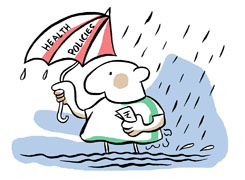Need Expert Advice?Our Gurus Can Help

Komal Jethmalani
Dietician, Diabetes Expert
465 Answers | 64 FollowersFollow
She specialises in weight loss and diabetes management.
Jethmalani has completed her MSc in food and nutrition from SNDT University and trained at Jaslok Hospital.
She is a NDEP-certified diabetes educator.... more
Answered on Feb 09, 2026

Answered on Feb 09, 2026
Answered on Feb 09, 2026

Answered on Feb 09, 2026

Answered on Feb 09, 2026

Answered on Feb 01, 2026

Answered on Feb 01, 2026

Answered on Feb 01, 2026

Answered on Feb 01, 2026

Answered on Feb 01, 2026

or infused water (fruit flavor without sugar).
Answered on Feb 01, 2026

beans (black, kidney, chickpeas), tofu and soy products, nuts and seeds and choose lean animal proteins like fish, skinless poultry, eggs, low?fat dairy (yogurt, milk, cottage cheese). Spread protein across meals rather than eating large amounts at once.
Answered on Feb 01, 2026

Answered on Feb 01, 2026

Answered on Feb 01, 2026

Answered on Jan 15, 2026

Answered on Jan 15, 2026

Answered on Jan 15, 2026

Answered on Jan 15, 2026
Answered on Jan 15, 2026

Answered on Jan 15, 2026

Answered on Jan 15, 2026

Answered on Jan 15, 2026
Answered on Oct 28, 2025

Answered on Oct 22, 2025

Answered on Oct 22, 2025

Answered on Oct 22, 2025

Answered on Oct 22, 2025

Answered on Oct 22, 2025

Answered on Oct 22, 2025

Answered on Oct 22, 2025

Answered on Oct 22, 2025

Answered on Oct 17, 2025

Answered on Oct 17, 2025

Choose whole carbs with brown rice, oats, sweet potatoes, whole wheat breads and add smoothies and shakes. Do resistance training and stay hydrated.
Answered on Oct 17, 2025

Stay hydrated.
Answered on Oct 17, 2025

Answered on Oct 17, 2025

Answered on Oct 17, 2025

Answered on Oct 17, 2025

Answered on Oct 17, 2025

Answered on Oct 17, 2025

Answered on Oct 15, 2025

eggs and fish, citrus fruits, pumpkin seeds and almonds. Foods for weight gain include bananas, mangoes, dates, and raisins, whole grains like oats, brown rice, and millets; healthy fats like ghee, peanut butter, nuts, seeds and protein-rich foods. Foods to reduce premature greying include amla (Indian gooseberry), curry leaves and iron rich foods, etc. Sleep well and exercise regularly.
Answered on Oct 15, 2025

Answered on Oct 15, 2025

Answered on Oct 15, 2025

Answered on Oct 15, 2025

Answered on Oct 15, 2025

Answered on Oct 15, 2025

Answered on Oct 15, 2025

Answered on Oct 15, 2025

Answered on Aug 02, 2025





